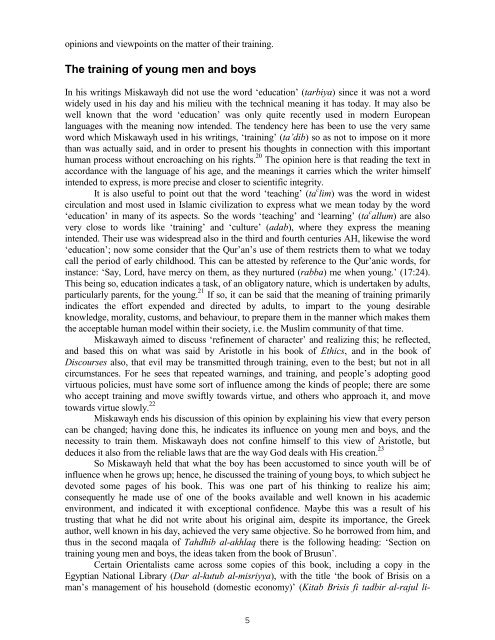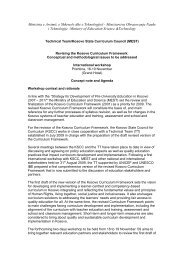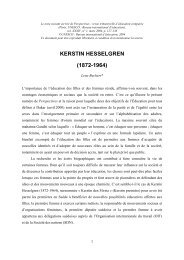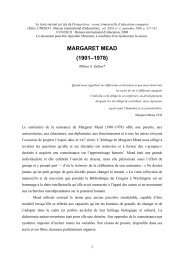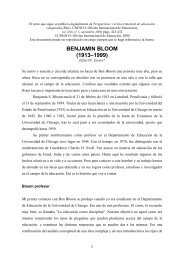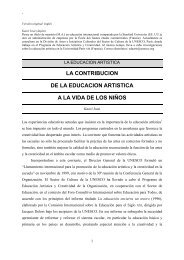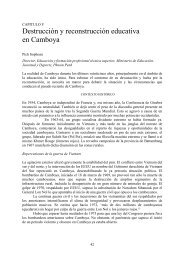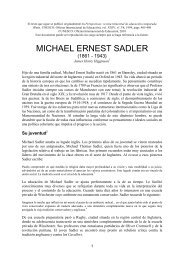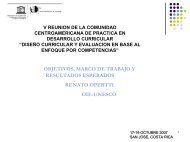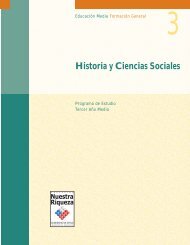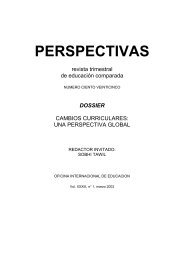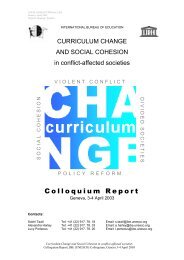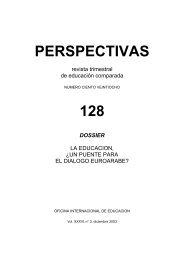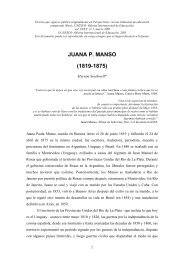MISKAWAYH - International Bureau of Education - Unesco
MISKAWAYH - International Bureau of Education - Unesco
MISKAWAYH - International Bureau of Education - Unesco
You also want an ePaper? Increase the reach of your titles
YUMPU automatically turns print PDFs into web optimized ePapers that Google loves.
opinions and viewpoints on the matter <strong>of</strong> their training.<br />
The training <strong>of</strong> young men and boys<br />
In his writings Miskawayh did not use the word ‘education’ (tarbiya) since it was not a word<br />
widely used in his day and his milieu with the technical meaning it has today. It may also be<br />
well known that the word ‘education’ was only quite recently used in modern European<br />
languages with the meaning now intended. The tendency here has been to use the very same<br />
word which Miskawayh used in his writings, ‘training’ (ta’dib) so as not to impose on it more<br />
than was actually said, and in order to present his thoughts in connection with this important<br />
human process without encroaching on his rights. 20 The opinion here is that reading the text in<br />
accordance with the language <strong>of</strong> his age, and the meanings it carries which the writer himself<br />
intended to express, is more precise and closer to scientific integrity.<br />
It is also useful to point out that the word ‘teaching’ (ta c lim) was the word in widest<br />
circulation and most used in Islamic civilization to express what we mean today by the word<br />
‘education’ in many <strong>of</strong> its aspects. So the words ‘teaching’ and ‘learning’ (ta c allum) are also<br />
very close to words like ‘training’ and ‘culture’ (adab), where they express the meaning<br />
intended. Their use was widespread also in the third and fourth centuries AH, likewise the word<br />
‘education’; now some consider that the Qur’an’s use <strong>of</strong> them restricts them to what we today<br />
call the period <strong>of</strong> early childhood. This can be attested by reference to the Qur’anic words, for<br />
instance: ‘Say, Lord, have mercy on them, as they nurtured (rabba) me when young.’ (17:24).<br />
This being so, education indicates a task, <strong>of</strong> an obligatory nature, which is undertaken by adults,<br />
particularly parents, for the young. 21 If so, it can be said that the meaning <strong>of</strong> training primarily<br />
indicates the effort expended and directed by adults, to impart to the young desirable<br />
knowledge, morality, customs, and behaviour, to prepare them in the manner which makes them<br />
the acceptable human model within their society, i.e. the Muslim community <strong>of</strong> that time.<br />
Miskawayh aimed to discuss ‘refinement <strong>of</strong> character’ and realizing this; he reflected,<br />
and based this on what was said by Aristotle in his book <strong>of</strong> Ethics, and in the book <strong>of</strong><br />
Discourses also, that evil may be transmitted through training, even to the best; but not in all<br />
circumstances. For he sees that repeated warnings, and training, and people’s adopting good<br />
virtuous policies, must have some sort <strong>of</strong> influence among the kinds <strong>of</strong> people; there are some<br />
who accept training and move swiftly towards virtue, and others who approach it, and move<br />
towards virtue slowly. 22<br />
Miskawayh ends his discussion <strong>of</strong> this opinion by explaining his view that every person<br />
can be changed; having done this, he indicates its influence on young men and boys, and the<br />
necessity to train them. Miskawayh does not confine himself to this view <strong>of</strong> Aristotle, but<br />
deduces it also from the reliable laws that are the way God deals with His creation. 23<br />
So Miskawayh held that what the boy has been accustomed to since youth will be <strong>of</strong><br />
influence when he grows up; hence, he discussed the training <strong>of</strong> young boys, to which subject he<br />
devoted some pages <strong>of</strong> his book. This was one part <strong>of</strong> his thinking to realize his aim;<br />
consequently he made use <strong>of</strong> one <strong>of</strong> the books available and well known in his academic<br />
environment, and indicated it with exceptional confidence. Maybe this was a result <strong>of</strong> his<br />
trusting that what he did not write about his original aim, despite its importance, the Greek<br />
author, well known in his day, achieved the very same objective. So he borrowed from him, and<br />
thus in the second maqala <strong>of</strong> Tahdhib al-akhlaq there is the following heading: ‘Section on<br />
training young men and boys, the ideas taken from the book <strong>of</strong> Brusun’.<br />
Certain Orientalists came across some copies <strong>of</strong> this book, including a copy in the<br />
Egyptian National Library (Dar al-kutub al-misriyya), with the title ‘the book <strong>of</strong> Brisis on a<br />
man’s management <strong>of</strong> his household (domestic economy)’ (Kitab Brisis fi tadbir al-rajul li-<br />
5


